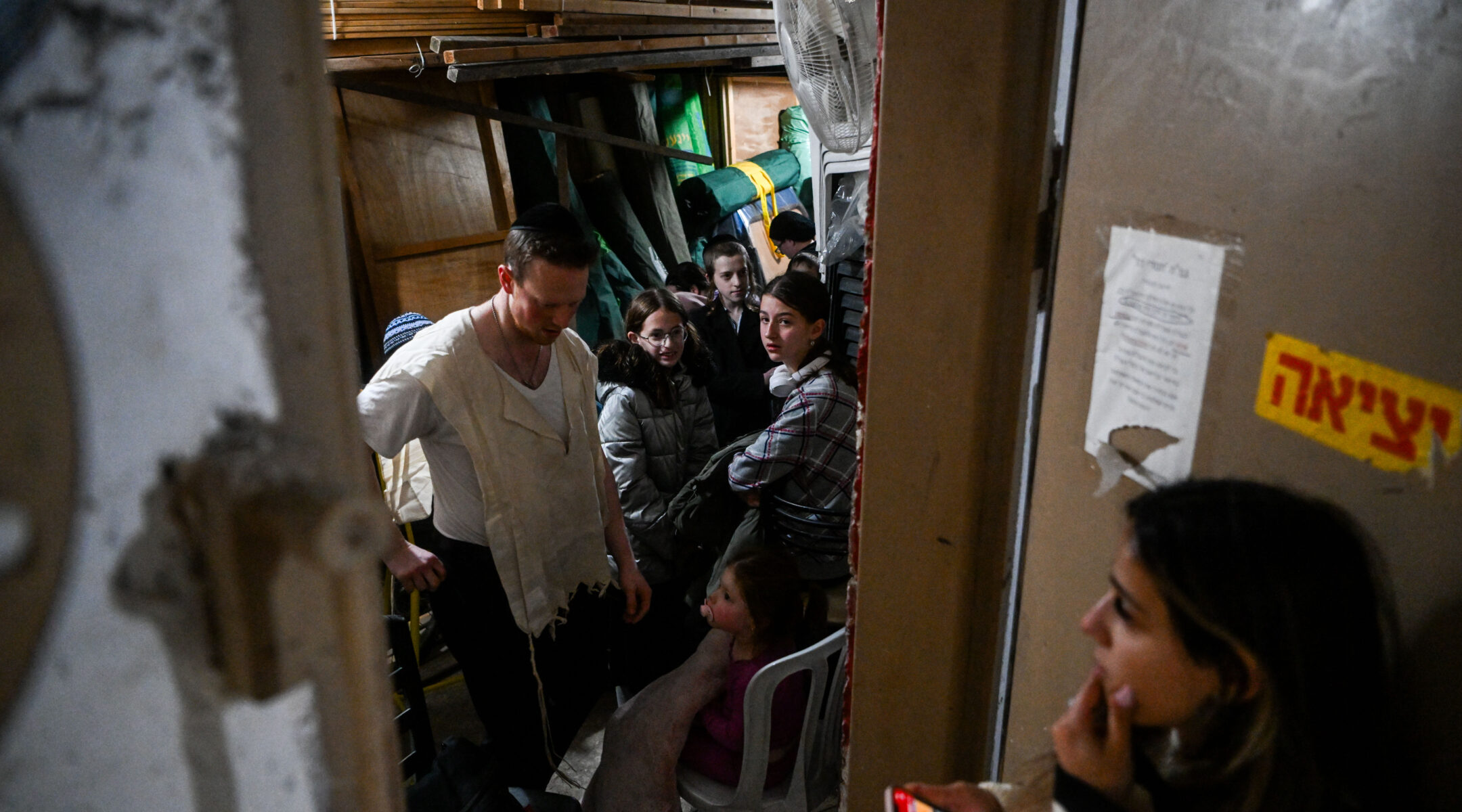(JTA) — The sirens started blaring all over Israel just before 2 a.m. — in the south, in the north, near army bases around the country and, unusually, in and around Jerusalem.
The sirens are meant to stop Israelis in their tracks — or wake them from their slumber — and send them rushing to safe rooms when an air infiltration is detected.
Not that many people were sleeping easily. The barrage came after days of increasingly insistent warnings that Iran was planning to attack Israel, and hours after Israeli leaders, tipped off by U.S. officials, confirmed that Tehran had let loose an unprecedented volley of missiles.
Hundreds would be shot down on their way toward and over Israeli territory. For Israelis already on edge after six months of war with Hamas in Gaza, the warnings and then the assault made for a fear-filled night.
“I’ve never been blessed to need to wake up the kids and run … until now,” Michal Sklar, an American who moved to Jerusalem, wrote in an Instagram story. “Everyone singing nigguns [wordless Jewish songs] in the staircase helped. I’m now fully dressed and feel like I have 7 cups of coffee in me.”
Beatie Deutsch, the trailblazing Orthodox marathoner, posted about being atypically terrified during the assault.
“Tonight has not been an easy night,” Deutsch wrote in an Instagram story, in words imposed over a video of an overhead explosion taken from where she lives in a small community near Jerusalem. “I have never woken up in the middle of the night since the beginning of the war, but tonight I was frozen. Psalms on repeat. … I actually thought our Moshav was being attacked.”
In the lead-up to the attack, Israelis had largely gone about their lives while also stocking up on bottled water and making sure their phones stayed charged. Social media posts showed busy beaches on Saturday in Tel Aviv and in Jerusalem, the central Gan Sacher park resounded with celebrations for Sri Lankan New Year.
But after the IDF announced that rockets were incoming, the parties stopped and people headed home to hunker down. Soon, the sound of explosions filled the air — not of rockets reaching their targets, but of interceptions that prevented them from doing so. Israeli officials said several hours after the assault that 99% of the drones and missiles aimed at Israel had been shot down.
“As I sit in the mamad [safe room], dozens of explosions in the background, the only thing I can think about is how much I love each and every one of the people who developed and took care of all our interception systems,” tweeted Amit Mandelbaum, an Israeli tech entrepreneur. “Thank you, you are our angels.”
For some Israelis, gratitude about the functioning of the defense systems was entwined with disdain for the government for what its critics say is a predilection for conflict. Just before the attack began, tens of thousands of Israelis had turned out in Tel Aviv for a weekly anti-government protest that has recently resumed and strengthened, despite a new ban on large gatherings.
“Sorry to sound so basic, but there is nothing funny or normal about sitting at home anxiously waiting for missiles to reach us because of pyromaniacs with no regard for law or justice for over six months,” one woman, Sivan Tahel, wrote on Facebook. “Nothing.”
Others who have been critical of the government focused on thanking Israel’s allies.
“Thank you, President Biden. Thank you, U.S. military. Thank you for helping to protect our children tonight. We Israeli parents owe you after this night,” tweeted Amir Tibon, a journalist who is on leave from the left-wing newspaper Haaretz while he completes a book about his family’s harrowing Oct. 7 experience. He was among survivors of Hamas’ assault on Israel to meet with Biden in October and has praised him effusively since.
Before the rockets flew, Tibon had joked on X, formerly Twitter, about his family’s preparation for the Iran threat.
“Being married to a Russian, the granddaughter of the survivors of the siege of Leningrad, means that tonight I’m not standing in line at the supermarket or the Super-Pharm, because she sent me to buy everything for a week in the shelter the very day we killed that Iranian general in Damascus,” he had written.
Tibon was far from the only Israeli to joke about the threat. Social media was filled with memes and quips of varying degrees of darkness posted by anxious Israelis accustomed to countering danger with gallows humor.
“As far as I’m concerned, this is an exercise by some product manager … from the Home Front Command who realized that people were starting to uninstall their app and had to meet the quarterly goals of active users,” tweeted a man who works in Israel’s high-tech sector.
One meme circulating on social media accused Iran of trying to pour chametz, or food that cannot be eaten on Passover, into Israel in advance of the holiday that starts next week.
In the Secret Jerusalem Facebook group, amid serious posts about safe-room security and how to make sure phone alerts would work despite a national scrambling of GPS signals to complicate attackers, jokes about Passover prevailed. Wrote one woman, “I’m making sure that my chametz is packed into my emergency bag — and ready to be stress eaten.”
On Sunday morning, Israelis woke from their interrupted sleep to a sunny day, a sweeping sense of relief and even more efforts to make light of a scary situation. The order to stay close to their bomb shelters had been lifted.
In a video she posted to social media, the comedy influencer Michal Greenspan, a recent immigrant from the United States whose posts typically aim to explain Israel to non-Israelis, compared Iran to a man — known in contemporary slang as an “f—boy” — who tells a casual partner he’s coming over, prompting a frantic set of preparations, and then doesn’t arrive anytime soon.
“It takes nine hours to get here and then finally they get here and they have the audacity to, like, barely show up,” Span says in her bit. “And then when they do show up, they’re just like, ‘We’re done. If you actually want to hang, you’re going to have to come to me.’ I’m going to have to come to you?! … What kind of toxic masculinity is this?”
JTA has documented Jewish history in real-time for over a century. Keep our journalism strong by joining us in supporting independent, award-winning reporting.






